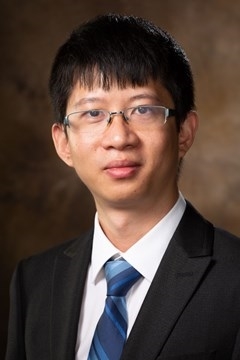Lu Zhang, assistant professor in the Department of Computer Science and Computer Engineering, has been awarded a $484,828 grant from the National Science Foundation division of Information and Intelligent Systems (NSF IIS) to support his research, "III: Small: Counterfactually Fair Machine Learning through Causal Modeling."
Machine learning refers to the use and development of computer systems that can learn and adapt without following explicit instructions by using algorithms and statistical models to analyze and draw inferences from data patterns.
Zhang's research aims to reduce discrimination during intelligent machine learning by defining bias in data and learning algorithms and applying methods to reduce bias in machine-automated decisions.
"It is a very important task to ensure that machine learning models for making important decisions such as hiring, admission, loan granting, etc., are not subject to discrimination," said Zhang. "We already know that discrimination in machine learning could come from two sources, the training data used to build the decision-making model and the machine learning algorithms themselves."
To this end, this groundbreaking study will determine unidentifiability challenges in causal inference (i.e. drawing conclusions by studying known facts and evidence) by digging into the deep-seated reasons of unidentifiability and deriving mathematical bounds around unidentifiable causal effects.
This project innovatively applies Judea Pearl's structural causal models to the fair machine learning field. Pearl is credited with invention of Bayesian networks, a mathematical formalism for defining complex probability models.
After developing techniques and tools, Zhang will develop quantitative measures for existing fairness notions as well as propose new fairness notions that are compatible with the framework. He will incorporate proposed fairness measures into machine learning model construction and make the proposed framework more generally applicable.
While most previous studies were mainly based on correlation or association in the decision-making process, this project will emphasize the importance of treating discrimination as a causal effect and apply the causal inference techniques in fair machine learning studies. The causal question is used when a study wants to determine if a causal variable affects an outcome variable, and in this study will ask something like whether an individual would receive the same decision if the individual been of a different demographic group by race, sex, age, religion or other attributes. Using causal inference techniques to quantitatively measure the discriminatory effects from data, Zhang will incorporate non-discrimination when building fair machine learning models.
Xintao Wu, Computer Science and Computer Engineering professor and Zhang's collaborator on this project, will work with Zhang on designing and implementing the causal modeling-based machine learning framework.
Wu and Zhang have collaborated on a series of research projects demonstrating the presence of bias in training data and machine learning algorithms and developing a variety of fair machine learning algorithms to remove bias. The collaborative research has produced over a dozen research articles published in top venues in artificial intelligence and data analytics.
A 2017 study entitled "A Causal Framework for Discovering and Removing Direct and Indirect Discrimination," published by the International Joint Conference on Artificial Intelligence, and by Lu Zhang, Yongkai Wu, and Xintao Wu, can be found cited in the United States House of Representatives Committee on Financial Services address to Federal Reserve Chairman Jerome H Powell. (See reference [19] on page 3 — Racial Bias Concerns in Artificial Intelligence and Machine Learning Technology).
"We are very glad to know our research work has impact on both the research community and society," Xintao Wu added.
More information about Zhang's research can be found on the National Science Foundation website and Zhang's personal website.
Topics
Contacts
Sarah Burkes, media specialist
Computer Science and Computer Engineering
479-575-7338, sburkes@uark.edu
Jennifer P. Cook, director of communications
College of Engineering
479-575-5697, jpc022@uark.edu
